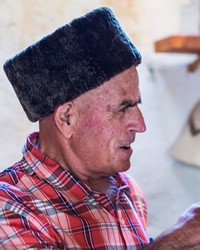Kabardian in Jordan

Photo Source:
Dan Zelazo - Flickr
Creative Commons
|
Send Joshua Project a map of this people group.
|
| People Name: | Kabardian |
| Country: | Jordan |
| 10/40 Window: | Yes |
| Population: | 169,000 |
| World Population: | 1,178,000 |
| Primary Language: | Kabardian |
| Primary Religion: | Islam |
| Christian Adherents: | 0.05 % |
| Evangelicals: | 0.04 % |
| Scripture: | New Testament |
| Ministry Resources: | Yes |
| Jesus Film: | Yes |
| Audio Recordings: | Yes |
| People Cluster: | Caucasus |
| Affinity Bloc: | Eurasian Peoples |
| Progress Level: |
|
Introduction / History
The Kabardians—over one million total in worldwide population, in the North Caucasus—are the largest surviving 'tribe' of the northwestern Caucasus' Circassian language family. (The Adyghe are the other surviving Circassian major people group in the Caucasus.) In an earlier era, venerating sacred trees – also mountains, horses, fire and a pantheon of gods – was part of the Kabardians' eclectic pagan/Christian/Islamic blend of religious practices. But this "Tree of Life," its seven sets of branches woven to form a skyward arrow, is a monument to the victims of the century-long Russo-Circassian wars that ended in 1864. Considering the Circassians' epic devastation and the tragic expulsion/emigration/destruction of ninety percent of their population from their homelands in Russia, the Kabardians' national survival in any form into modern times is almost unbelievable. So now, every Kabardian wedding represents future hope for a people who came so dangerously close to ethnic extermination.
Most of them remain in the Caucasian Mountains, but some have migrated to Western countries like Germany and the US. Others are in Turkey, Syria, Saudi Arabia, and Jordan.
What Are Their Lives Like?
Like many other Kabardian newly-married couples in Nal 'chik, capital of Kabardino/Balkaria Republic, Azamat and Zalena exit the government building where marriages are registered and—in a noisy honking caravan with family and friends—drive their way to Pse Zhyg ("Tree of Life"). They lay flowers, hear solemn words from the wedding master and extend upturned palms as an imam prays. Why – with the later exuberance of traditional dancing, joyful feasting, accordion and drum playing, celebratory pistols firing into the air.
For all their past plights, Kabardians embody some remarkable aspects of human beauty and strength. If a people's proverbs reveal their cultural values, attentive hospitality certainly ranks high. One can find a hundred folk sayings on the sacred duties of host-guest relationships in Kabardian "khabze," that is, their traditional norms of behavior or customary protocol. For example, "A guest is a messenger from God." Or, "The guest of a Kabardian is as safe as if protected by a fortress."
Honor for elders and those with recognized status is also a value. One familiar with the rules of Khabze would be able to tell which persons in a line of folks walking abreast down a sidewalk are accorded the proper places of respect in that line. Khabze would also determine the intentional seating arrangement in a living room conversation or at a meal. Youth are trained to serve and defer to elders.
Kabardian national dances reveal this code of honor. The straight backs, regal movements and modest costuming all display a dignity and pride in Kabardian heritage.
Like all human cultures this precious people have darkened hearts. Equal to hospitality as a cultural value is the code of blood revenge. While not always literally practiced, it underscores a generationally ingrained defensiveness and unwillingness to reconcile offenses. There is corruption in spheres of life from politics to academics to business degrades society.
What Are Their Beliefs?
Once characterized by folk Islam, Kabardians are now increasingly plagued by an encroaching attraction to radicalism among many youth. They are officially Sunni Muslim, but few are well versed in the Koran.
What Are Their Needs?
Attacks and counterattacks between rebels and military/police both claim innocent lives and exacerbate instability and deepen bitterness and mistrust in the region. Innocent people need protection from those who use religion as a means to gain political power.
Prayer Points
Pray that spiritual barriers that have kept the gospel from advancing would be broken down.
The 75-100 scattered Kabardian believers have an opportunity to shine as lights. Pray for boldness, love, unity, and vision.
Pray for the circulation of translated Scriptures into Kabardian cultural circles. The Kabardian New Testament was published in 2011. Audio versions of Luke, Ruth, Jonah and (hopefully) Proverbs are also prepared. Pray for the completion of the entire Bible in Kabardian in the next decade.
Ask for divinely prepared people who will believe the good news and also lovingly, courageously share it throughout their entire relational network.
Pray for a reproducing, culturally relevant movement of faith – that Jesus can be seen as 'fully dressed in Kabardian clothes.'
Pray miracles, visions, dreams and other means would pave the way for a response to Jesus.
Beseech God that thousands upon thousands of Kabardians might someday experience eternal hope and refreshment at The Tree of Life (Revelation 2:7; 22:1-3) whose leaves are for the healing of the nations!